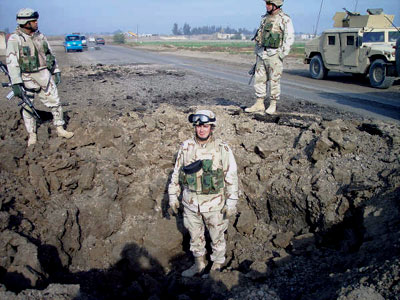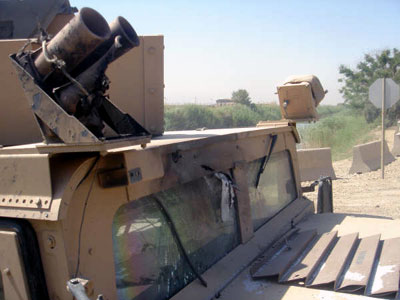
I thanked a fellow soldier for dropping me off at the train station. The man behind the glass waved his hand when I tried to pay the fare and pointed to the metal door. I smiled and hurried to hop on the train.
The Q train would take me right where I wanted to be. For the first time in almost 16 months, I was on the subway. Everything looked too familiar. The only strange thing was my clothing. My desert uniform, faded from the bright Iraqi sun and stretched from frequent washing; my worn-out boots, rucksack on my back, and the look on my face surely gave me away as a soldier returning from overseas.
I struggled to be oblivious to the curious faces turned toward me. I had no desire to answer any questions or acknowledge them. I was enjoying the ride, knowing that I would not return to Iraq ever again. Though familiar, the surroundings looked different, as I imagined they would after my absence.
The real reason this particular ride felt so different was that I was traveling on my own. There was no company of comrades by my side. I also missed the feel of my assault rifle’s sling around my shoulder.
I challenged my mind to think about something else. But how could I? I caught myself eyeing every movement, every detail around me, not because I expected something to happen, but because I had learned to be observant.
It was one hour before midnight, yet there were so many people out — not an unusual sight in Brooklyn. In some 30 minutes, I would be walking into my parent’s place. My wife was also expecting me there. I could hardly picture what it would be like to see them. They would never stop asking questions.
Just then, I noticed a poorly dressed couple drunkenly arguing with each other as they entered, their voices rising above the drumming of the wheels. The sleepy passengers stayed clear and disregarded them. Two teenagers with coffee cups raced over to the empty spot on the bench near me.
A person can expect anything to happen on a train in Brooklyn at that hour, I thought.
The doors opened and closed. My mind raced back. I remembered Iraq, the last evening when I was sitting outside the tent before boarding a bus to the airport. An explosion could be heard in the distance beyond the wire. I didn’t care. There was nothing I could do. For me, it had been scarier waiting to go on patrol than actually patrolling. But that evening I rejoiced because I had finished my tour, I wasn’t going on patrols anymore, and I was ready to fly home. As usual, it was more than 90 degrees that evening. The blazing sun and stifling heat emanating from the ground made it difficult to stay alert for a prolonged time.
The heat-trapping bulletproof vest and gear added at least 20 pounds on me. Soldiers complained about the weight and discomfort, but wore them during missions and inside the camp when ordered. At the end of every patrol, I always appreciated cool air. That was in the past now.
Holding the handrail, I glanced over my right hand and recalled the patrol on a hot day in May when an antitank grenade and another explosive were thrown at the vehicle I was driving. That day, it was my turn to drive the last vehicle in convoy. The grenades carry a copper charge that, when heated, turns into plasma that can slice through armor. This particular charge penetrated the transparent armor in front of me and stopped inches from my hands. Later I found small, burned dots over my sleeves.
The adrenaline rush was surreal. Such charges are the most lethal weapon used against the coalition forces in Iraq. I couldn’t believe how lucky I was as I stared at my bloody hands. The dust and smoke all around made it nearly impossible to discern whether everybody was alive. The blown-up tires added to the frenzy, as I tried to control the vehicle. The explosions damaged the gunner’s ear, but otherwise we were okay. Then the pain settled in. It was nothing I couldn’t tolerate, but my hand swelled and I was unable to use it for a few days.
When we finally stopped and secured the area, I was surprised to find that Iraqi civilians weren’t afraid. In fact, it was just the opposite. They gathered around, watching mostly in silence. It was not the first time we had come under attack, but this was the closest I had come in harm‘s way. The attackers dispersed, as they did most of the time, leaving us no chance to fight back. I was taken to a medical facility, and my patrols stopped for a while. I found out later that no useful information had been obtained from the bystanders. I didn‘t blame them.
I was glad to learn that the gunner did not sustain serious injuries in the attack. My hands also healed in time. The speck — shrapnel too small to be surgically removed — could be seen on an X-ray of my right hand. Although the incident happened more than five months ago, I remembered it clearly.

The train exited the tunnel and was approaching a stop. The doors opened, and the cool night air rushed in. No new passengers entered the car. Those who remained inside seemed oblivious of me as well as of everything else around us. The quarrelling couple was silent, and the teenagers looked out the window behind them. A few seats became available, but I chose to continue standing. I had spent too long sitting on a bus, traveling to the armory where the army finally released me.
As the train started to slow, the teenagers became anxious. I would think it normal to be uneasy traveling without supervision at their age, but there was something unusual in the way they jumped up when the train halted. Before running out, one of the kids threw the coffee cup, aiming at the tipsy woman in the corner. Neither the passengers nor I flinched. The cup missed, hitting the wall above the woman’s head. The lid flew off, the cup’s contents splashing over the woman, who muttered something under her breath. I kept a sharp eye on the kids, as they ran across the platform toward the staircase. The train then made a clucking noise and started to leave the station.
I was surprised at how calm the passengers, including the couple, were.
There was no perceptible way to know whether anybody cared, even though they clearly saw what had just happened. With the exception of a bulky man asleep with headphones, all the passengers looked as if they were stoned. For a few brief seconds, they moved their eyes slightly in the direction of the distressed woman, who tried to brush off the liquid. The man across from her paid no attention. Nothing followed but the beat of the moving train.
I stood there shocked, thinking that an action like that could get a man killed in a war zone. There was no way to know what the kid had in his hand. It all happened too fast. I was surprised to find myself standing motionless, not dropping to the floor or looking for concealment.
But it didn’t matter. The train was carrying me closer to my destination.
I haven’t seen my family since December when I had a two-week furlough.
I got off the train at Kings Highway. Almost home, I was delighted to be back.
- Follow us on Twitter: @inthefray
- Comment on stories or like us on Facebook
- Subscribe to our free email newsletter
- Send us your writing, photography, or artwork
- Republish our Creative Commons-licensed content

